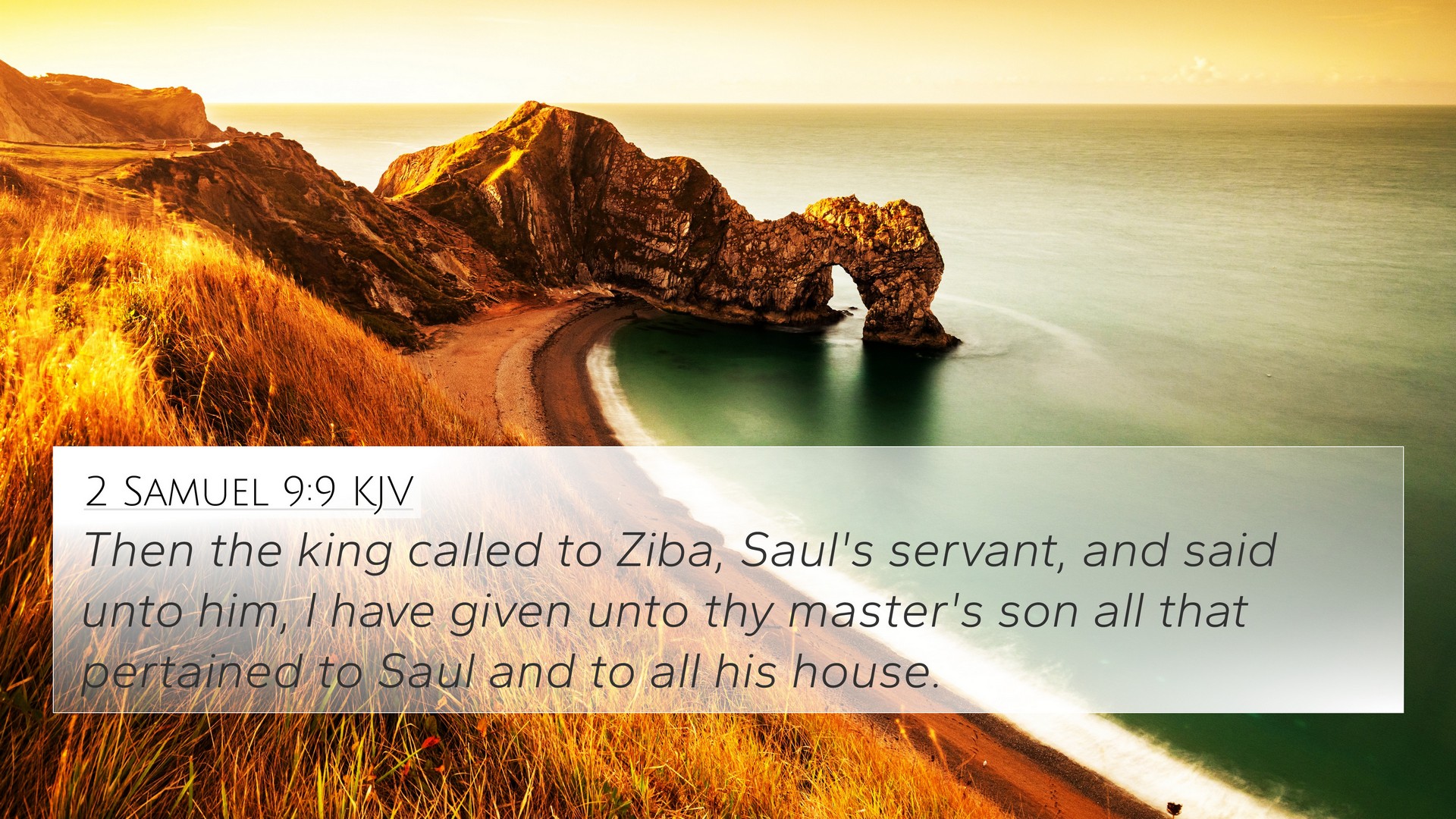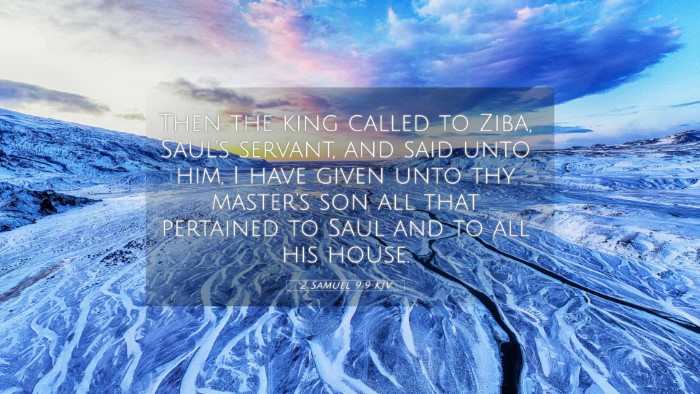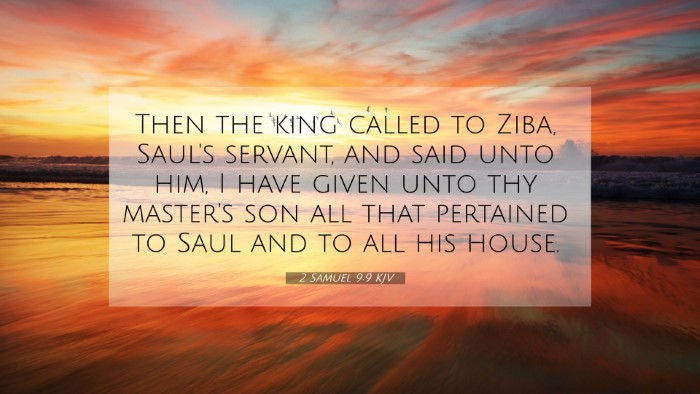Old Testament
Genesis Exodus Leviticus Numbers Deuteronomy Joshua Judges Ruth 1 Samuel 2 Samuel 1 Kings 2 Kings 1 Chronicles 2 Chronicles Ezra Nehemiah Esther Job Psalms Proverbs Ecclesiastes Song of Solomon Isaiah Jeremiah Lamentations Ezekiel Daniel Hosea Joel Amos Obadiah Jonah Micah Nahum Habakkuk Zephaniah Haggai Zechariah Malachi2 Samuel 9:9 Similar Verses
2 Samuel 9:9 Cross References
Then the king called to Ziba, Saul's servant, and said unto him, I have given unto thy master's son all that pertained to Saul and to all his house.
Uncover the Rich Themes and Topics of This Bible Verse
Listed below are the Bible themes associated with 2 Samuel 9:9. We invite you to explore each theme to gain deeper insights into the Scriptures.
2 Samuel 9:9 Cross Reference Verses
This section features a detailed cross-reference designed to enrich your understanding of the Scriptures. Below, you will find carefully selected verses that echo the themes and teachings related to 2 Samuel 9:9 KJV. Click on any image to explore detailed analyses of related Bible verses and uncover deeper theological insights.
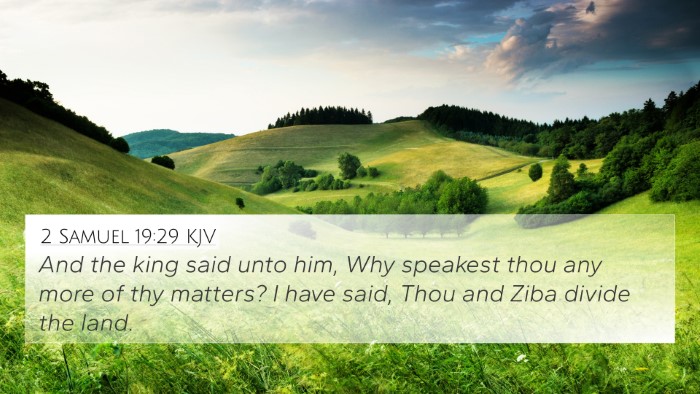
2 Samuel 19:29 (KJV) »
And the king said unto him, Why speakest thou any more of thy matters? I have said, Thou and Ziba divide the land.
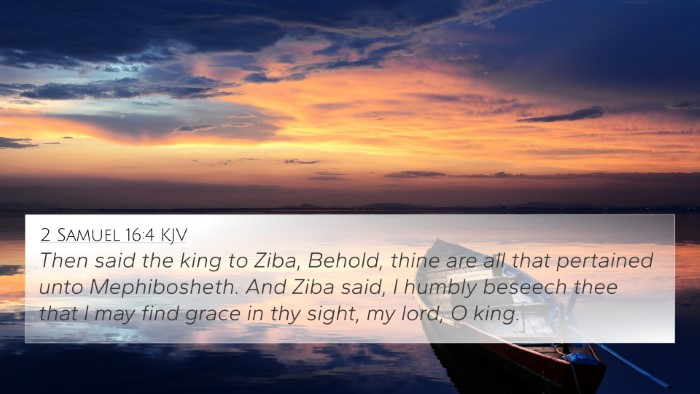
2 Samuel 16:4 (KJV) »
Then said the king to Ziba, Behold, thine are all that pertained unto Mephibosheth. And Ziba said, I humbly beseech thee that I may find grace in thy sight, my lord, O king.
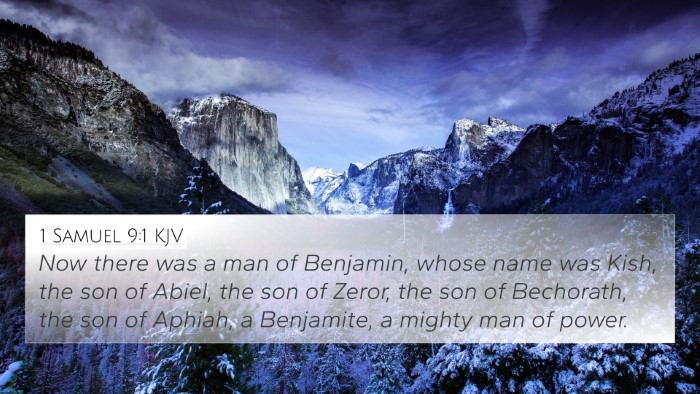
1 Samuel 9:1 (KJV) »
Now there was a man of Benjamin, whose name was Kish, the son of Abiel, the son of Zeror, the son of Bechorath, the son of Aphiah, a Benjamite, a mighty man of power.
2 Samuel 9:9 Verse Analysis and Similar Verses
Understanding 2 Samuel 9:9
Bible Verse: 2 Samuel 9:9
Verse Text: "Then the king summoned Ziba, Saul's steward, and said to him, 'I have given your master's grandson everything that belonged to Saul and his family.'" (2 Samuel 9:9, NIV)
Summary of Meaning
This verse encapsulates King David’s act of kindness toward Mephibosheth, the son of Jonathan, and grandson of Saul. It marks a significant moment reflecting David’s loyalty to his covenant with Jonathan and his compassion in restoring the fortunes of a member of Saul’s household.
Insights from Commentaries
Matthew Henry's Commentary
Matthew Henry emphasizes that David's kindness serves as a model of grace and mercy. It highlights the idea that true leadership includes compassion and the will to restore rather than to destroy. David's actions indicate that he honors his covenant with Jonathan, showing how relationships can transcend rivalry and strife.
Albert Barnes' Notes on the Bible
Albert Barnes points out the significance of Ziba, who was the steward of Saul's estate. He indicates that David not only provides for Mephibosheth but actively restores his family's property. This action symbolizes restoration of dignity and status to someone marginalized due to familial and political changes. Barnes notes that this gesture of David demonstrates the biblical principle of grace, extending beyond what is merely deserved.
Adam Clarke's Commentary
Adam Clarke elaborates that this verse reflects the royal prerogative, as kings had the authority to distribute lands and properties as they see fit. Clarke also highlights the weight of David's promise to Jonathan, emphasizing the importance of loyalty and love in relationships. Moreover, he notes that this act begins a narrative of redemption for Mephibosheth, who, despite his disabilities, gets a place at the king's table.
Bible Cross-References
- 1 Samuel 20:14-15: Jonathan's covenant with David demonstrates loyalty and friendship.
- 2 Samuel 4:4: Introduction of Mephibosheth and his condition, emphasizing his vulnerability.
- 2 Samuel 9:7: David explicitly tells Mephibosheth that he will restore to him all the land of Saul.
- Luke 14:21-23: The parable of the great banquet reflects similar themes of invitation and inclusion.
- Psalm 36:7-9: Celebrations of God's unfailing love and the satisfaction found in His presence parallel David’s kindness.
- Isaiah 56:3-5: A promise of inclusion for those marginalized, similar to Mephibosheth's restoration.
- Matthew 5:7: Blessed are the merciful, for they shall obtain mercy—reflecting David's actions.
Connections Between Bible Verses
The act of David granting Mephibosheth heirship signifies a core Biblical theme: the grace extended to those who are undeserving. This resonates throughout Scripture, from Old Testament covenants to the New Testament message of grace through Jesus.
Thematic Bible Verse Connections
This verse connects deeply with several themes:
- Restoration: David’s actions symbolize God's desire to restore humanity.
- Covenant Loyalty: Just as Jonathan and David had a covenant, God’s covenants are characterized by faithfulness.
- Grace and Mercy: The Biblical narrative consistently showcases God’s mercy toward the undeserving.
- Inclusion of the Marginalized: Mephibosheth’s place at the table mirrors Jesus’ ministry to the outcasts.
Comparative Analysis of Key Themes
Through a comparative analysis of various Biblical themes surrounding 2 Samuel 9:9, one can observe that the inclusion of the weak and marginalized is a recurring idea:
- Grace under the Law: Understanding how grace operates within the Old Testament context and how it is fulfilled in Christ.
- Mercy in Leadership: Leaders in the Bible, such as David, Abraham, and Joseph, exhibit mercy that reflects God's character.
- Inheritance Through Grace: New Testament theology expands on the inheritance of believers through grace, paralleling Mephibosheth’s claim to Saul's lands.
Tools for Bible Cross-Referencing
To deepen understanding, utilizing tools like a Bible concordance or Bible cross-reference guide can aid in exploring these connections:
- Bible Concordance: Useful for locating verses based on key terms and phrases.
- Bible Cross-Reference Guide: Guides that help in finding parallel texts across Scripture.
- Cross-Reference Bible Study: This method helps in analyzing how different scriptures interact.
User Intent and Inquiry
For those seeking deeper insights on 2 Samuel 9:9, consider these inquiries:
- What verses relate to God’s grace?
- How do the actions of David compare with Christ’s mission?
- Where in the New Testament does mercy and restoration occur?
Conclusion
2 Samuel 9:9 stands as a profound example of Biblical mercy, restoration, and covenant faithfulness. David’s kindness to Mephibosheth serves as a testament to the overarching themes present in the Bible that link both the Old and New Testaments. Through cross-referencing and careful study, readers can glean richer insights into God's character and His desire to restore humanity.
